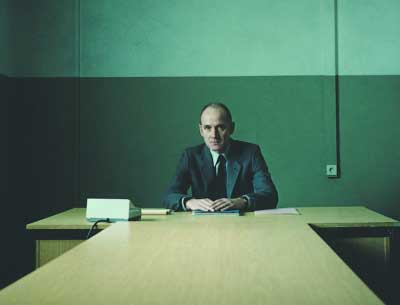|
A few years ago, German director Wolfgang Becker had an international hit with his tragicomic film, Good Bye Lenin! The movie—which contained a notably fresh and appealing lead performance by Daniel Bruhl—concerned a young East Berliner named Alex whose mother, Christiane, suffers a severe heart attack and goes into an eight-month coma, sleeping straight through the fall of the Berlin Wall. When Christiane awakes, her doctor warns Alex that any sudden shock will kill her. Christiane, it turns out, is a former Communist youth counselor and a true believer in the Marxist-Leninist utopia. Therefore, her son must resort to every subterfuge he can—even to faking food labels and TV news broadcasts—to persuade his mother that her misnamed but beloved German Democratic Republic is alive and well.
It is interesting to think about Good Bye Lenin! in the context of Florian Henckel von Donnersmarck's Oscar-winning political thriller, Das Leben der Anderen (The Lives of Others). It's easy, and perhaps not completely inaccurate, to think that The Lives of Others puts the lie to Good Bye Lenin!, and that the latter film put too happy a face on an intolerable political tyranny. What I think is truer, however, is to say that The Lives of Others demonstrates how the Communist government betrayed Christiane, and everyone else in the GDR.
The Lives of Others begins, appropriately enough, in 1984, five years before the toppling of the Berlin Wall. Capt. Gerd Wiesler (Ulrich Muhe), its protagonist, is as much a true believer as Christiane, but in a much more sinister fashion. A member of the feared Stasi security police, an expert in both surveillance and interrogation, Wiesler lives only to expose his government's enemies. Rigid and unsmiling, with no graces or small talk, he has no personal life, unless you can call an occasional visit from a government-paid prostitute a personal life.

One day Lt. Col. Anton Grubitz (Ulrich Tukur), Wiesler's ambitious boss and the closest thing Wiesler has to a friend, surprises him with tickets to the theater. The play is by star playwright Georg Dreyman (Sebastian Koch), who is present at the performance, and the lead is played by Christa-Maria Sieland (Martina Gedeck), the GDR's finest actress and Dreyman's live-in girlfriend.
Dreyman has the reputation of being a loyal Socialist, but Wiesler—the best bloodhound, so to speak, in the entire Stasi—takes one look at the playwright and senses something suspicious about him—something "arrogant," to use Wiesler's own words. He urges that Dreyman be kept under constant surveillance. The oily Grubitz reports Wiesler's observations to high government official Bruno Hempf (Thomas Thieme)—taking credit for them himself, of course. Hempf himself has reasons to suspect Dreyman, and he and Grubitz order Wiesler to drop everything else and begin surveillance of Dreyman, at once.
Those who know their Graham Greene and John Le Carre won't be surprised that what Wiesler discovers about Dreyman is of considerably less significance than what he learns about himself and the system he serves. It is also no hyperbole to say that Henckel von Donnersmarck's screenplay is worthy of comparison with the work of those masters. The Lives of Others is a remarkably astute film as well as a remarkably thrilling one, and the key to its art is Henckel von Donnersmarck's insight into how totalitarian regimes throw the human spirit—for better or worse—into bas-relief.
Some may find it hard to believe that a man as brilliant as Dreyman could be so naïve about the regime under which he has lived all his life, or that a hard case like Wiesler could be moved by a mere intellectual like Dreyman. But it is precisely in their deviation from the norm that the whole story lies. Dreyman and Wiesler, in a sense, could be called the two sides of Christiane. Dreyman, like Christiane an idealist and humanist, believes he can reform the system by pointing out its injustices, even if he has to publish his exposes abroad. Wiesler, like Christiane a true believer in the socialist system, not only is disabused of such notions about the state, but in his way helped to make the state what it is. He can serve that state, unswervingly and uncomplainingly, as long as he believes it acts always for the greater good. However, what he hears from Dreyman's apartment moves him in ways he never expected. He appreciates Dreyman and Christa-Maria's happiness without envying it, and he finds himself feeling protective of these people who still possess an idealism he himself was forced to abandon long ago. But his true moment of revelation comes when, one night, he sees Christa-Maria leaving Hempf's limousine. In a flash, he sees his superiors' true motives in ridding the state of Dreyman, and something inside him changes irrevocably.
Certainly nothing changes inside Hempf or Grubitz, two thugs who would have been right at home in GoodFellas, and for whom the GDR is tailor-made. Slab-faced Hempf, a Brezhnev lookalike, demands warm bodies to sacrifice to the state, and Grubitz, who looks out for Number One in ways Wayne Dyer never envisioned, is delighted to oblige. Hempf loves to condescend to the intellectuals who lobby him for favors; when, at a reception, Dreyman asks him if a blacklisted director can hope to be allowed to work again, Hempf answers, "Of course, dear fellow, he can hope until he dies! And even beyond that!" Grubitz, the model of a kiss-up, kick-down boss, practices his toxic bonhomie with glee; the scene in which he baits a young Stasi lieutenant who has just told an anti-government joke is one of the most harrowing in the movie.
Of all the characters, Christa-Maria is the saddest. As more than one reviewer has noted, in a less repressive society Christa-Maria would have been lionized, going from triumph to triumph, and would never have been tested in any serious way. Her political opinions, idealistic and utopian, would have been recorded in the media, her face and voice prominent at every antiwar protest and liberal political fundraiser. In the GDR, she's just another powerless, fatally flawed artsy type whom Hempf, Grubitz, and all other government predators can exploit at will, in every way and to any purpose, on pain of prison and ostracism.

All of the acting in The Lives of Others is superb, but the performances of Sebastian Koch and Ulrich Muhe go beyond praise. It is difficult to portray moral probity on screen and make it both believable and interesting, as Koch does with seeming effortlessness. It is even harder to begin a film as a perceived monster, and—without making any outward changes—slowly alter the audience's perception of the character until it is overwhelmed with his moral splendor. Not since Billy Bob Thornton's performance in Sling Blade have I seen an actor work such alchemy as Muhe does here.
There is a moment of recognition at the end of The Lives of Others, and some who have seen the film have quarreled with Dreyman's choice of action in consequence. I will only say that I understood Dreyman's choice, and that it makes a poetically appropriate ending to the film. But I myself, in the same position, might have done something different.
The Lives of Others looks perfect; cinematographer Hagen Bogdanski gives the film an appropriately cold, grainy look, and production designer Silke Buhr captures the essential shabbiness of Communist East Berlin, with its crumbling apartment blocks and streets empty except for a few battered Trabants and Ladas. Henckel von Donnersmarck is particularly sardonic in noting the changes in theater design before and after the Wall came down, staging the same play with factory-line socialist realism in 1984 and with avant-garde minimalism in 1990. The beautiful score by Gabriel Yared and Stephane Moucha includes a piano piece, "Sonata for a Good Man," the title of which changes force and emphasis during the film.
One of the many splendors of Henckel von Donnersmarck's story is that it demonstrates the often-quoted, but also often-refuted, axiom that one man can make a difference. In The Lives of Others, it is two men who make a difference, though one will remain unsung. All the others, meanwhile, must get through the tyranny as best they can. The unlucky Christa-Maria is forced to make compromise after compromise; Christiane, in a more protected place, never has to wake from her sleep; and Alex, luckiest of all, outlives it.
|
